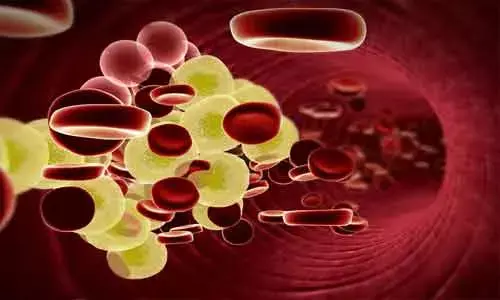- Home
- Medical news & Guidelines
- Anesthesiology
- Cardiology and CTVS
- Critical Care
- Dentistry
- Dermatology
- Diabetes and Endocrinology
- ENT
- Gastroenterology
- Medicine
- Nephrology
- Neurology
- Obstretics-Gynaecology
- Oncology
- Ophthalmology
- Orthopaedics
- Pediatrics-Neonatology
- Psychiatry
- Pulmonology
- Radiology
- Surgery
- Urology
- Laboratory Medicine
- Diet
- Nursing
- Paramedical
- Physiotherapy
- Health news
- Fact Check
- Bone Health Fact Check
- Brain Health Fact Check
- Cancer Related Fact Check
- Child Care Fact Check
- Dental and oral health fact check
- Diabetes and metabolic health fact check
- Diet and Nutrition Fact Check
- Eye and ENT Care Fact Check
- Fitness fact check
- Gut health fact check
- Heart health fact check
- Kidney health fact check
- Medical education fact check
- Men's health fact check
- Respiratory fact check
- Skin and hair care fact check
- Vaccine and Immunization fact check
- Women's health fact check
- AYUSH
- State News
- Andaman and Nicobar Islands
- Andhra Pradesh
- Arunachal Pradesh
- Assam
- Bihar
- Chandigarh
- Chattisgarh
- Dadra and Nagar Haveli
- Daman and Diu
- Delhi
- Goa
- Gujarat
- Haryana
- Himachal Pradesh
- Jammu & Kashmir
- Jharkhand
- Karnataka
- Kerala
- Ladakh
- Lakshadweep
- Madhya Pradesh
- Maharashtra
- Manipur
- Meghalaya
- Mizoram
- Nagaland
- Odisha
- Puducherry
- Punjab
- Rajasthan
- Sikkim
- Tamil Nadu
- Telangana
- Tripura
- Uttar Pradesh
- Uttrakhand
- West Bengal
- Medical Education
- Industry
Reduction in LDL-C associated with decreased risk of stroke

Poland: A recent study, published in the Archives of Medical Science has shed light on the debatable association between low low-density lipoprotein cholesterol (LDL-C) and different stroke types. This was a meta-analysis of 355,591 observational studies and 165,988 randomized controlled trials.
The study found that a reduction in LDL-C with available therapies is associated with a reduction of all strokes and ischemic strokes; however, for ischemic stroke, such an association was not seen. This could be useful for determining the optimal LDL-C range and help to plan future lipid-lowering drug (LLAs) studies.
Maciej Banach, Polish Mother's Memorial Hospital Research Institute (PMMHRI), Lodz, Poland, and colleagues aimed to systematically evaluate the impact of LDL-C levels (cohort studies) and lipid lowering drugs (LLAs, RCTs) on the different types of stroke.
For this purpose, the researchers searched the online databases up to 1st September 2019. For quantitative data synthesis, the DerSimonian-Laird method and generic inverse variance methods were used. To evaluate the optimal sample size to detect a 35% reduction in outcomes after administration of lipid-lowering drugs, trial sequential analysis (TSA) was used.
Salient findings of the study are as follows:
- Participants at the highest category of LDL-C had a lower risk of hemorrhagic stroke (RR: 0.91) compared with the lowest category of LDL-C.
- Subjects with the highest category of LDL-C had a higher risk of ischemic stroke (RR: 1.11) compared to the lowest LDL-C category.
- LLAs decreased the risk of all types of strokes for those who achieved LDL-C<1.8 mmol/L (<70 mg/dL; RR=0.88, absolute risk reduction [ARR]: 0.7 %, number needed to treat (NNT): 143, I2:53%, n=13).
- Statin therapy decreased the risk of all strokes (RR=0.88, ARR: 0.6 %, NNT: 167, I2:56%).
- With regard to ischemic stroke only, LLAs decreased the risk of ischemic stroke for those who achieved LDL-C <1.8 mmol/L (<70 mg/dL; RR=0.75, ARR: 1.3%, NNT: 77, I2:0%); the same was observed for statins (RR= 0.76, ARR: 1.3%, NNT: 77, I2:32%).
- TSA indicated that both benefit boundaries and the optimal sample size were reached.
- There was no significant effect of LLAs regardless of the achieved level of the LDL-C on the risk of hemorrhagic stroke; however, TSA indicated that further studies were needed to settle the question and most of the effects were subject to high levels of heterogeneity.
"LDL-C reduction with available therapies is in general associated with the reduction of all strokes and ischemic strokes; such an association was not seen for hemorrhagic stroke, where no significant results were observed," the researchers wrote in their study.
"Further studies are still needed to determine the effects of low to extremely low LDL-C levels on hemorrhagic stroke and the role of LLAs," they concluded.
Reference:
Banach M, Shekoohi N, Mikhailidis DP, et al. Relationship between low-density lipoprotein cholesterol, lipid-lowering agents and risk of stroke: a meta-analysis of observational studies (n = 355,591) and randomized controlled trials (n = 165,988). Archives of Medical Science. 2022;18(4):912-929. doi:10.5114/aoms/145970.
Dr Kamal Kant Kohli-MBBS, DTCD- a chest specialist with more than 30 years of practice and a flair for writing clinical articles, Dr Kamal Kant Kohli joined Medical Dialogues as a Chief Editor of Medical News. Besides writing articles, as an editor, he proofreads and verifies all the medical content published on Medical Dialogues including those coming from journals, studies,medical conferences,guidelines etc. Email: drkohli@medicaldialogues.in. Contact no. 011-43720751


